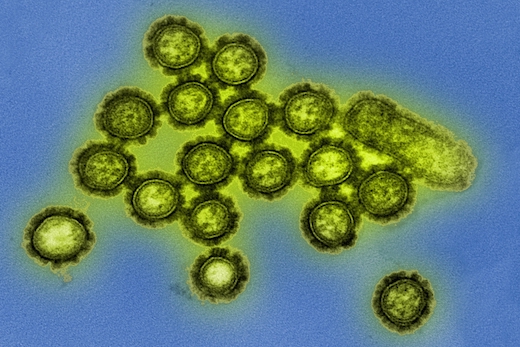With the flu killing an average of 20,000 people annually in the United States and posing the larger threat of global pandemics, Emory University’s strides in influenza research carry the hope of saving lives here and abroad.
A $15.89 million National Institute of Allergy and Infectious Disease (NIAID) contract gives the university’s concerted efforts to fight influenza a major shot in the arm by enabling researchers to move an investigational drug candidate into human testing.
“This contract will allow us to address a major health threat posed by these potentially deadly influenza viruses, including the highly pathogenic avian/bird flu,” says George Painter, PhD, director of EIDD and CEO of DRIVE and principal investigator on the contract. “The aim of this proposal is to develop a better drug against influenza.”
NIAID awarded the Emory Institute of Drug Development (EIDD) a contract to develop and test its drug candidate, EIDD-2801, in humans. EIDD-2801 is licensed and commercially developed by Drug Innovation Ventures at Emory (DRIVE), a wholly owned LLC of Emory University.
“This contract underscores our abilities to discover and develop drugs for urgent public health needs. Our goal is to help make the world healthier and less dangerous,” says Dennis Liotta, PhD, executive director of EIDD.
The contract includes plans for Phase I safety studies and Phase II challenge studies in healthy volunteers who will be made temporarily sick with the flu. They will be given the drug to test the effect of EIDD-2801 on their symptoms, viral levels and infectivity.
In collaboration with scientists at Georgia State University led by Richard Plemper, PhD, the drug was shown to blunt disease severity and suppress viral spread in animal models, when tested against seasonal and avian flu. This week, a Science Translational Medicine paper from the GSU Institute for Biomedical Sciences showed how EIDD-2801 presents a high barrier to influenza viruses that might develop resistance mutations.
EIDD-2801 is an oral ribonucleoside analog that inhibits the replication of multiple RNA-based viruses, including respiratory syncytial virus, chikungunya, Venezuelan equine encephalitis virus and Eastern equine encephalitis viruses.
Outbreaks of mosquito-borne Eastern equine encephalitis virus infection have recently been reported in several U.S. states. In 2016, the Defense Threat Reduction Agency awarded EIDD a $9.7 million contract to develop drugs against equine encephalitis viruses. EIDD-2801 is also effective against those viruses in animal models, as a prophylactic and a therapeutic.
About NIAID:
NIAID’s mission is to conduct and support basic and applied research to better understand, treat and ultimately prevent infectious, immunologic and allergic diseases. NIAID has a unique mandate, which requires the institute to respond to emerging public health threats.
About EIDD:
EIDD provides the multidisciplinary capabilities that are required to effectively advance cutting-edge drug discovery and development programs at the preclinical stage. It is housed in a state-of-the-art laboratory and office space specifically designed to support dedicated teams focused on medicinal and process chemistry, virology and molecular biology, bioanalytical chemistry, drug metabolism and pharmacokinetics.
About DRIVE:
DRIVE was formed as a not-for-profit drug development company wholly owned by Emory. It has an internal program working on the discovery and development of nucleoside/nucleotide analogs, the cornerstone of modern antiviral medicine, against the greatest unmet viral threats. Learn more.

